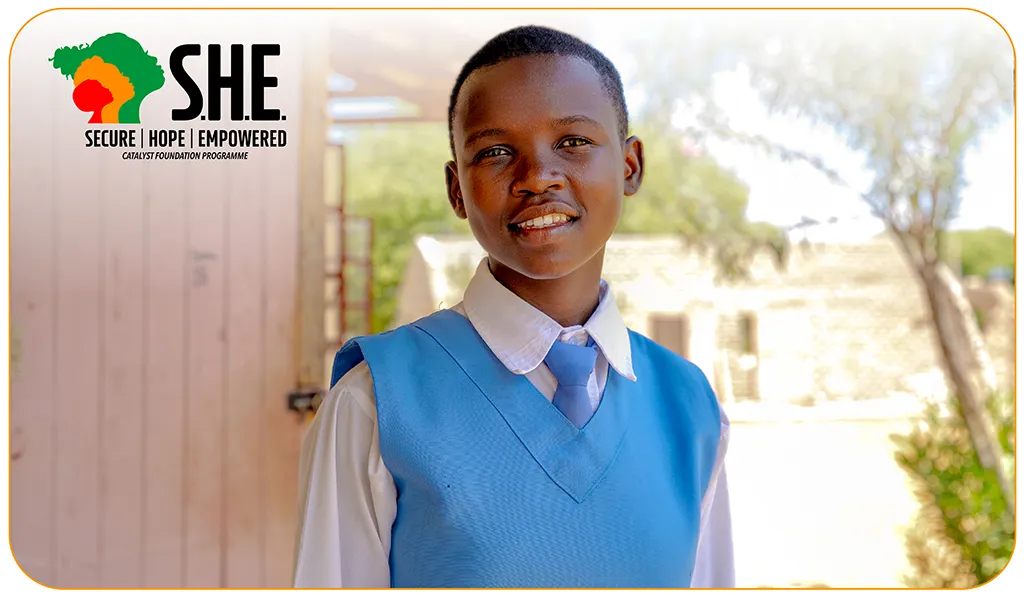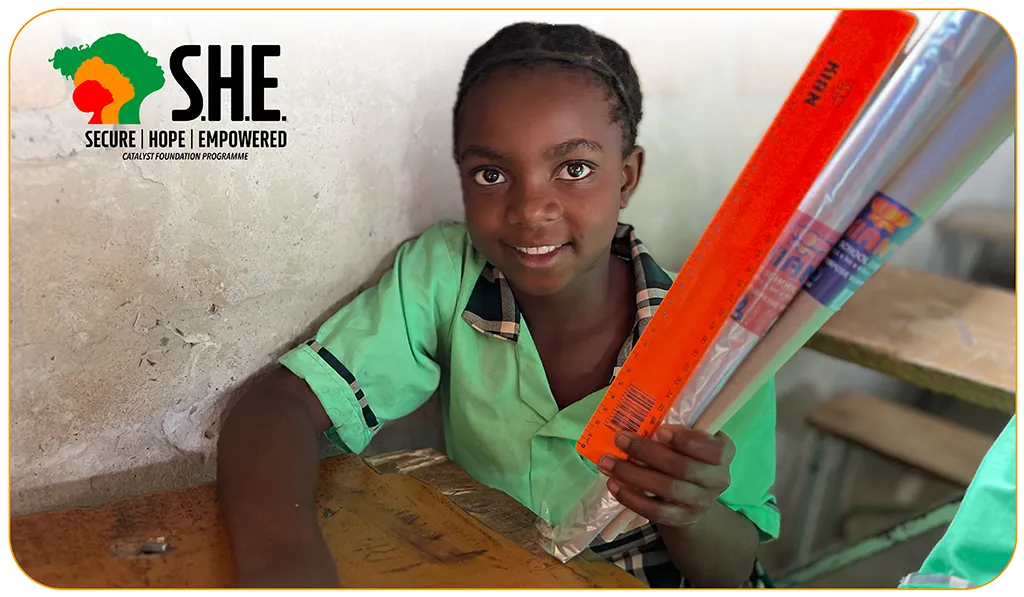Table of Contents
Introduction: The Foundation of a Thriving Society
At Catalyst Foundation, we often reflect on the profound truth that the very strength of any community, any country, and ultimately, our world, is intricately linked to the health and well-being of its women and girls. This is a truth we witness every single day in the marginalised communities of Zimbabwe and Zambia. Often overlooked, yet profoundly impactful, women’s health forms the bedrock upon which families thrive, local economies grow, and societies progress. At the heart of this crucial discussion lies menstrual health – a fundamental aspect of a woman’s life that, when neglected or stigmatised, possesses the power to derail education, limit opportunities, and erode dignity.
Here at Catalyst Foundation, our S.H.E. (Secure, Hope, Empowered) Programme is deeply committed to championing the holistic health of women and girls, particularly within the rural and marginalised communities across Zimbabwe and Zambia where needs are often greatest. Through our S.H.E. (Secure, Hope, Empowered) Programme’s menstrual hygiene support pillar, we stand on the front lines, working tirelessly to ensure that every woman and girl can experience a healthy, dignified, and empowered life. This blog post will delve into the critical importance of women’s health, with a special focus on menstrual health, highlight the global significance of World Menstrual Health Day, and showcase the tangible impact of our work in breaking down barriers and fostering a future where health is a right, not a privilege.
The Silent Crisis: Why Women’s Health Matters
Women’s health encompasses a vast spectrum, from reproductive and maternal health to mental well-being and general physical health. When women are healthy, they are better able to contribute their invaluable skills and energy to their families, their communities, and national development. Conversely, neglecting women’s health has far-reaching consequences, perpetuating cycles of poverty, limiting educational attainment, and hindering economic growth for entire generations.
Within the broader scope of women’s health, menstrual health stands out as a particularly underserved area, especially in many parts of Africa. For far too long, menstruation has been shrouded in silence, cultural taboos, and a pervasive lack of understanding. This silence creates what we call a “silent crisis,” where girls and women often face significant challenges in managing their periods hygienically, comfortably, and with dignity. These challenges include:
- Period Poverty: This is the harsh reality of being unable to afford or access adequate menstrual hygiene products. Imagine a young girl, eager to learn, having to miss school simply because she does not have a sanitary pad.
- Lack of Facilities: Many schools, workplaces, and public spaces in marginalised areas lack clean, private, and safe sanitation facilities. This makes managing menstruation discreetly and hygienically an impossible task, leading to discomfort and potential health risks.
- Misinformation and Stigma: Harmful myths, deeply ingrained cultural taboos, and a general lack of accurate information often led to profound shame, embarrassment, and social exclusion. Girls may be told they are “unclean” or forbidden from certain activities during their periods.
- Health Risks: When proper hygiene practices are impossible due to a lack of resources, girls and women face an increased risk of infections and other health complications, further compounding their challenges.
These issues are not merely discomforts; they are significant barriers to education, economic participation, and overall well-being, particularly for girls’ health education in rural Zimbabwe and Zambia. Research indicates that one in five girls in some rural areas of Zimbabwe miss school during their periods, and similar challenges are seen in Zambia. This means that a natural biological process directly impacts a girl’s fundamental right to education.
World Menstrual Health Day: A Global Call to Action
Every year on May 28th, the world observes World Menstrual Hygiene Day. This date was chosen intentionally: 28 days is the average length of the menstrual cycle, and menstruation itself lasts for an average of 5 days. This day serves as a crucial global platform to:
- Break the Silence: It compels us to encourage open dialogue about menstruation, actively challenging the stigma and taboos that have surrounded it for far too long.
- Raise Awareness: It is a day to educate communities about the vital importance of good menstrual hygiene management and its profound impact on health, education, and human rights.
- Advocate for Policy Change: It is a moment to push for policies that ensure access to affordable menstrual products, adequate sanitation facilities, and comprehensive menstrual health education for all.
- Mobilise Resources: It is a call to action for governments, organisations, and individuals to invest meaningfully in menstrual health initiatives.
The importance of World Menstrual Hygiene Day cannot be overstated. It transforms a private, often hidden experience into a public health and human rights issue, galvanising collective action to ensure that no woman or girl is held back by her period. This year we worked with Dzidzo Safepad Initiative to teach girls about menstrual hygiene and how to make reusable pads.

Breaking Barriers with our S.H.E. Programme
We stand at the forefront of addressing the multifaceted challenges related to women’s and menstrual health in Zimbabwe and Zambia. Our approach is holistic, deeply rooted in the community, and designed to create sustainable change that truly lasts.
- Comprehensive Education: We conduct extensive workshops in schools and communities, providing accurate, age-appropriate, and culturally sensitive education on the menstrual cycle, hygiene practices, and essential self-care. Crucially, these sessions are not exclusively for girls; we actively engage boys, men, teachers, and community leaders. This engagement fosters understanding, builds empathy, and cultivates male allyship, which is vital for breaking down ingrained societal norms. By dispelling myths and promoting factual knowledge, we empower girls to understand their bodies and significantly reduce the shame associated with menstruation. Our girls’ health education initiatives are changing perceptions from within, one conversation at a time.
- Access to Products and Facilities: A cornerstone of our work is actively combating period poverty in Africa. We strive to ensure that girls and women have consistent access to affordable or free menstrual products. This often involves distributing reusable sanitary pads and advocating for the provision of these essential items in schools and health centres. Simultaneously, we work hand-in-hand with communities to advocate for and support the development of clean, private, and safe sanitation facilities in schools and public spaces, ensuring dignity and dramatically reducing absenteeism.
- Advocacy and Awareness Campaigns: Beyond direct interventions, the S.H.E. Programme runs dynamic public awareness campaigns. We utilise social media, local media, and community events to challenge harmful stereotypes, promote open dialogue, and normalise menstruation. Our campaigns highlight the inspiring stories of resilience and triumph, inspiring others to join the movement to break menstrual stigma and create a more accepting society.
- Teacher and Community Leader Training: We recognize that truly sustainable change emanates from within the community itself. Therefore, we meticulously train teachers, local leaders, and health workers to become powerful champions of menstrual health. Equipped with accurate knowledge and practical resources, they can continue to educate, support, and advocate for girls long after our direct interventions, ensuring the impact is lasting.
Through these concerted efforts, our programme is making a tangible and measurable difference. Girls who once missed school due to their periods are now attending regularly, participating confidently in class, and actively pursuing their academic dreams. Women are feeling more comfortable and productive in their workplaces, free from the anxiety of managing their menstruation in secrecy.
The Ripple Effect: Investing in Her Health
Investing in women’s and girls’ health, particularly menstrual health, creates a powerful ripple effect that extends far beyond the individual. It touches every aspect of community life.
- Improved Education Outcomes: When girls can manage their periods with dignity, school attendance improves dramatically, leading to higher academic achievement and increased opportunities for higher education and skilled employment. This is a direct pathway out of poverty.
- Economic Empowerment: Healthy women are more productive in the workforce. By addressing menstrual health barriers, we enable women to participate fully in economic activities, contributing significantly to household income and national development.
- Reduced Child Marriage and Early Pregnancy: Girls who stay in school longer due to improved health and confidence are significantly less likely to be forced into early marriages or experience adolescent pregnancies, leading to better health outcomes for both mothers and children.
- Stronger Communities: When women and girls are healthy and empowered, they become active citizens, advocating for their rights, leading initiatives, and contributing to the overall well-being and resilience of their communities. They become the change-makers.
Gender Equality: Prioritizing menstrual health is a critical and non-negotiable step towards achieving true gender equality, ensuring that biological processes do not become a source of discrimination or disadvantage.
Call to Action: Join the Movement for Health and Dignity
The journey to a period-positive future, where every woman and girl can manage her menstruation with dignity and confidence, is ongoing. It is a long road, but with increased awareness, comprehensive education, and decisive collective action, we are confident that we can accelerate this progress.
We invite individuals, corporations, and organizations to partner with us in this vital mission. Your support enables us to expand our educational programs, provide essential menstrual products, and reach even more marginalized communities in Zimbabwe and Zambia.
- Donate: Every contribution, whether it is large or small, directly impacts a girl’s ability to stay in school and live with dignity. Please visit https://catalystfn.org/donate to make a difference today.
- Partner: We encourage you to explore corporate social responsibility (CSR) opportunities with us. Investing in women’s health is a powerful way to demonstrate your commitment to social impact and sustainable development. Please contact us at info@catalystfn.org for partnership inquiries.
Share Our Story: Help us amplify our message by sharing this blog post and our social media content. Awareness is always the crucial first step towards meaningful change.
A Future Without Shame
On World Menstrual Health Day and every single day, we stand firm in our unwavering commitment to breaking the chains of menstrual stigma. By prioritizing women’s health, particularly menstrual health, we are not just addressing a biological need; we are unlocking boundless potential, fostering inherent dignity, and empowering a generation of girls to embrace their bodies, pursue their dreams, and lead without shame. Join us in building a future where menstruation is celebrated as a natural part of life, and every girl can thrive.



